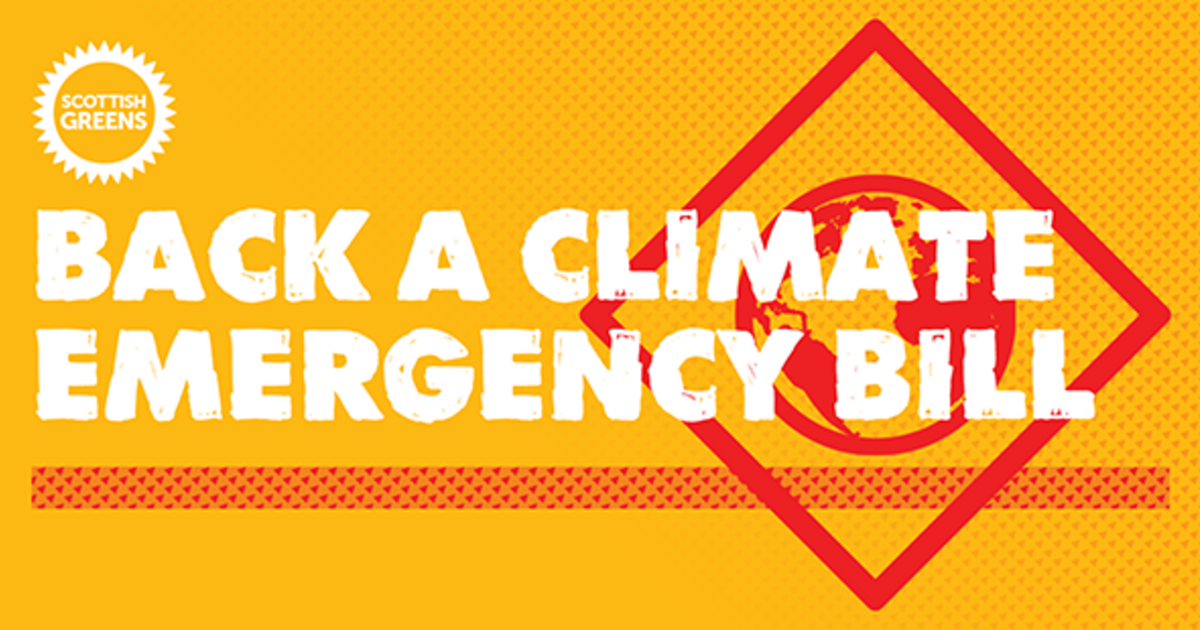10 policies that could accelerate climate action in Scotland now

Last year the IPCC warned that the world has just 12 years to do everything it can to avoid climate breakdown. We’re often told that Scotland is already doing everything it can to reduce emissions, so here’s ten policies the Scottish Greens are backing that could be implemented now, accelerating emission reductions and ensuring Scotland keeps its place at the front of the pack when it comes to fighting climate change.
You can support our campaign for a Climate Emergency Bill that would accelerate climate action here.
1. Lead a green energy transition
Scotland is on track to generate 100% of our electricity needs from renewables in the next 5 years. This is great progress but we need to see similar gains made in generating the energy we use for heating our homes from renewables rather than fossil fuels. Greens will support policies that support community renewable projects to set up and connect to the National Grid. We also support the introduction of a Scottish Renewable Energy Bond to finance further development and expansion of renewable energy in Scotland.
2. Divest from fossil fuels
Our investment in fossil fuels must end and instead use finance to support a transition to decommissioning and renewable energy generation. Pension funds are some of the largest sources of investment in the world and with auto-enrolment in workplace pensions now in place this is only expected to grow. Scottish Greens will call for policies to divest public bodies’ pension funds away from fossil fuels.
3. Increase funding for walking and cycling
The transport sector needs innovative policies to help Scotland reduce its emissions, according to the Scottish Government’s independent advisers. Walking and cycling for short, everyday journeys could significantly lower our carbon footprint and boost physical and mental health. A step change in funding is needed to provide safe path networks, good lighting and encourage people to leave the car at home. We are calling for active travel funding to be increased to £120m, or £25 per person, every year – this would put Scotland on a similar level of spend as the cycle-friendly Netherlands.
4. Better buses and reliable rail
Three-quarters of all public transport journeys in Scotland are made by bus yet many routes face cuts, fares are rising and service standards are slipping. We want the new Transport Bill to introduce policies that allow local councils to own and run their own bus companies that deliver for people not private profit. Rail services are facing similar problems of overcrowding and unreliable services. We are calling on the Scottish Government to develop a public sector bid for the Scotrail franchise in 2025, bringing the rail services back into public ownership.
5. Develop a district heating funding stream
Moving to renewable sources of energy for heating our homes is one of the biggest challenges for Scotland’s climate plans. In district heating schemes, a whole neighbourhood block can be powered by a single boiler fuelled by biomass or heat generated as a by-product of industrial activity. England and Wales have a £320m funding stream to deliver district heat networks over 3 years, but funds in Scotland are shared between a range of energy technologies. Greens are calling for greater funding for district heating networks.
6. Deliver warm homes for all
One in four households in Scotland are living in fuel poverty, spending more than 10% of their income on fuel bills. This is a national disgrace. Greens will push for all homes to achieve at least an EPC Band C rating by 2030 and work to set meaningful fuel poverty reduction targets in the forthcoming Fuel Poverty Bill.
Moving to renewable sources of energy for heating our homes is one of the biggest challenges for Scotland’s climate plans. In district heating schemes, a whole neighbourhood block can be powered by a single boiler fuelled by biomass or heat generated as a by-product of industrial activity. England and Wales have a £320m funding stream to deliver district heat networks over 3 years, but funds in Scotland are shared between a range of energy technologies. Greens are calling for greater funding for district heating networks.
7. Support climate-friendly farmers
Emissions from the agricultural sector have not declined over the past decade. To achieve its climate targets, Scotland needs to reduce its emissions from agriculture over the 10 years and support farmers to adopt climate-positive practices. Introducing a nitrogen budget for the agricultural sector would decrease the use of fossil fuel based fertilisers and deliver economic benefits to individual farmers.
Policies to support innovative forms of agriculture can help us reduce greenhouse gas emissions from this sector. We would like to see support for agroforestry schemes as well as a guarantee that post-Brexit farming subsidies reward farmers for delivering public goods, such as clean water and biodiversity.
8. Introduce a single-use plastic tax
It’s clear that society’s dependence on single-use plastic items is damaging our environment and polluting our marine ecosystems. Scotland has already taken steps to ban plastic stemmed cotton buds but much more radical action is needed to tackle the scourge of plastic pollution. Greens support introducing a levy on single-use coffee cups to reduce their use with the same success as the 5p plastic bag charge.
9. Introduce a workplace parking levy
Placing a levy on employers with a large number of parking spaces could incentivise employers to participate in cycle-to-work schemes and support employees to make low-carbon commutes. A workplace parking levy has been successfully introduced by Nottingham City Council, raising around £9m per year that is re-invested in alternative transport services.
10. Business support for environmentally responsible companies
We believe business support should only be available to those companies that promote social and environmental responsibility. We will campaign for those companies that are taking action to limit their climate emissions and boost local environments to be eligible for government business support.
Please take action and support our Climate Emergency Bill here.
